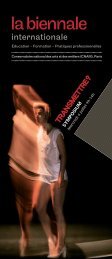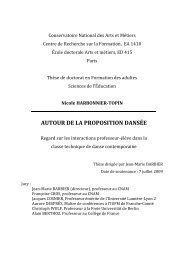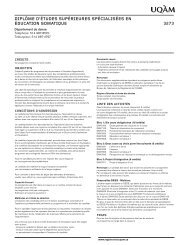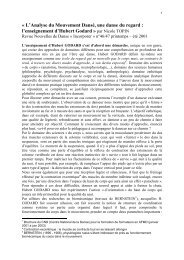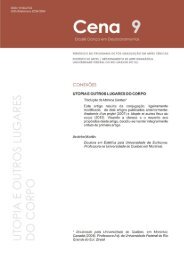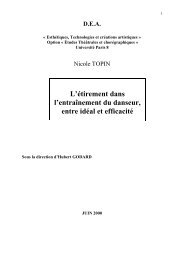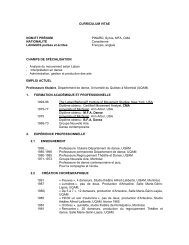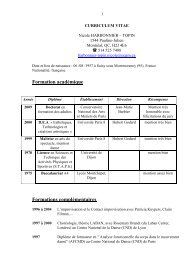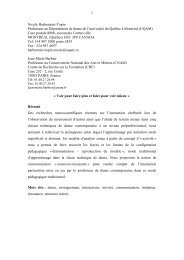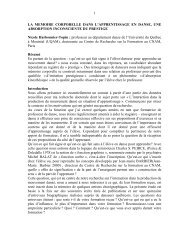Day 2 - Département de danse - UQAM
Day 2 - Département de danse - UQAM
Day 2 - Département de danse - UQAM
You also want an ePaper? Increase the reach of your titles
YUMPU automatically turns print PDFs into web optimized ePapers that Google loves.
12:30pm-2:00pm<br />
Buffet Lunch (provi<strong>de</strong>d) & Annual General Meeting<br />
Phoenix Theatre<br />
2:15pm<br />
a) Pedagogies of Canadian Theatre, or “Professor, There’s a Country in My Discourse!” George<br />
(to 5:30pm)<br />
Seminar Organizer: Robin C. Whittaker (St. Thomas University). Participants: Nancy Copeland<br />
(University of Toronto), Reina Green (Mt. St. Vincent University), Sasha Kovaks (University of Toronto),<br />
Michelle MacArthur (University of Toronto), James McKinnon (Victoria University of Wellington), Zita<br />
Nyarady (York University), Emily A. Rollie (University of Missouri), Eugenia Sojka (University of Silesia).<br />
Whether from within a Theatre, Drama, Performance Studies, English, or Interdisciplinary <strong>de</strong>partment, most universities in<br />
Canada offer a <strong>de</strong>dicated course on “Canadian Drama/Theatre.” In<strong>de</strong>ed, “Canadian” is the most commonly professed theatre<br />
specialization in these <strong>de</strong>partments, after “Shakespeare” (Whittaker “Casting and Makeup…”). Despite this wi<strong>de</strong>spread<br />
national self-interest, there has been scant study, or even discussion, of what “Canadian” plays, playwrights, companies, and<br />
histories appear on our syllabi, how we are teaching them, and to what end. What constitutes the pedagogy of Canadian<br />
drama, theatre, and performance in the un<strong>de</strong>rgraduate and graduate classroom, both here in Canada and abroad?<br />
In recent years, CATR has featured a number of well-received seminars on theatre pedagogy, and Kim Solga’s edited<br />
issue of CTR on “Performance and Pedagogy” illuminates the topic as it relates to what she refers to as the “activist” stu<strong>de</strong>nt in<br />
the classroom. As a Canadian theatre researcher who teaches a range of dramatic literature, theatre theory, and performance<br />
practice courses from within an English Department, I have become particularly interested in the “special case” of Canadian<br />
theatre in which stu<strong>de</strong>nts navigate the ubiquitous (“Canadian”) and the provocative (“theatre”) in an apparent feedback loop<br />
generated by Canadians teaching Canadians about Canadian theatre in Canada. I am interested in troubling this feedback<br />
loop by comparing some of our extant materials and approaches, then <strong>de</strong>veloping new ones.<br />
This seminar proposes to wa<strong>de</strong> into the collective consciousness of post-secondary Canadian theatre instruction in or<strong>de</strong>r<br />
to unearth those iterations of Canadian drama, theatre, and performance that influence future scholars, practitioners, and<br />
citizens. Is the post-Massey Commission “maturation discourse” of a “national theatre” (Alan Filewod, “Erect Sons…” and<br />
Performing Canada) the prevalent discourse in the classroom, whether overt or implied? Are the Wasserman volumes Mo<strong>de</strong>rn<br />
Canadian Plays so ubiquitous as to function canonically? How else do we re/frame the relationship between “Canada” and<br />
“theatre” for our stu<strong>de</strong>nts? This seminar intends to generate gui<strong>de</strong>d and meaningful discussion among those who teach<br />
Canadian plays, theatre histories, performances, and practices in or<strong>de</strong>r to examine what “Canadian” topics—however broadly<br />
<strong>de</strong>fined—are covered at universities, and to what end.<br />
b) Edgy Counter-Publics: Historicizing Girls’ and Women’s Place in Performance Bishop<br />
(to 3:45pm)<br />
Open Panel Mo<strong>de</strong>rator: Marlis Schweitzer (York University)<br />
“Rethinking ‘Real American Girls’ in the Early Twentieth Century.” Marlene Mendonça (York<br />
University)<br />
Although the turn of the twentieth century is not a starting point for discourses on girl culture, it does, however, provi<strong>de</strong> a<br />
crucial point of visibility for <strong>de</strong>bates about girlhood that moved across and was circulated by film, theatre, and literature and<br />
through transnational bor<strong>de</strong>rs. In taking a resolutely historical approach, this paper will link theoretical, historical and<br />
methodological frameworks in or<strong>de</strong>r to open up aca<strong>de</strong>mic discourses to new mo<strong>de</strong>s of thinking about the “mo<strong>de</strong>rn girl” and the<br />
theatre’s role in constructing, shaping and perpetuating girl culture in the early twentieth century.<br />
By examining early-twentieth-century theatre we can begin to question and un<strong>de</strong>rstand how girlhood was conceptualized,<br />
how it was performed, and how it was presented. Between 1880-1920 girls in their teens and twenties ran away from their<br />
homes in search for a career on stage. The stage-struck girl became the subject in newspaper and magazine articles, short<br />
stories, plays and even films. This paper is a close examination of Canadian born stage-struck girls: Marie Dressler, Mary<br />
Pickford, Margaret Anglin and Clara Morris, who were all—born in Ontario—and ironically consi<strong>de</strong>red “real American Girls,”<br />
and whose characters, on and off stage fed into <strong>de</strong>bates about mo<strong>de</strong>rnity and girlhood. Together these examples illustrate the<br />
role that these young Canadian girls had in shaping the social structures of American “girls.” They were instrumental in helping<br />
girls achieve a political voice both in and outsi<strong>de</strong> the theatre, while also positioning girls as active agents in the realm of labour<br />
and cultural politics.<br />
32



